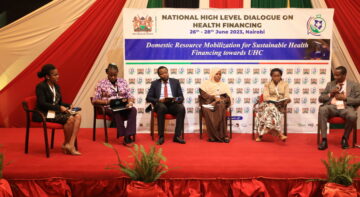Blogs

AFIDEP and partners are pleased to announce a new initiative aimed at institutionalizing evidence-informed decision-making (EIDM) in government health systems.
The initiative, known as the Heightening Institutional Capacity for Government use of Health Research (HIGH-Res) is a three -year project to be implemented in Kenya, Uganda and Malawi by an East Africa Consortium comprised of AFIDEP, the Kenya Medical Research Institute (KEMRI); the Uganda REACH-PI; the Malawi EvIDeNt network (comprising the Malawi Liverpool Wellcome Trust Centre (MLW); and the College of Medicine at the University of Malawi).
With the ultimate goal of enabling a sustained culture of EIDM in government decision-making, the project will work with the Ministries of Health in Kenya, Uganda and Malawi towards strengthening their existing institutional systems, cultures and processes in the use of health research in policymaking.
According to Dr Rose Oronje, Director of Public policy and Communications and project lead for the High-Res project, policy-making is a complex and dynamic process, often with a variety of actors, contexts and priorities. While reliable and timely evidence plays an important role in improving policy, programme and practice decisions, it is only one ingredient in the process.For the health sector, evidence is a very critical ingredient. “Effective health systems rely on quality, accessible data and evidence. The role of evidence cannot be underestimated in efforts to reform the health sector in Africa,” says… Click To Tweet
The project will design, implement and evaluate innovative and politically responsive interventions targeted at revamping systems within the health institutions to be more attuned to using evidence when making decisions, formulating policies and implementing actions. The proposed interventions will leverage and build on existing relationships and collaborations among consortium partners, and on existing efforts and mechanisms within the health sectors in Kenya, Uganda and Malawi to maximise programme impact.
Interventions
High-res interventions will include i) skills building in evidence synthesis and use; ii) promoting interaction between researchers and decision-makers within the health sector; iii) incorporating EIDM training in existing training programmes for health professionals and other civil servants, and iv) embedding EIDM incentives and innovations into Ministry of Health (MoH) systems and structures. To assess impact and effectiveness, implementation of the interventions will be continuously monitored and evaluated to provide lessons on what works in strengthening institutional capacity for EIDM.
Why Kenya, Uganda and Malawi?
These 3 countries were found ideal for the implementation of the project’s interventions due to 3 strategic reasons. First, these countries have demonstrated – through various initiatives over the past three decades, a strong interest and commitment to promoting EIDM in their health sectors. That the partner organisations have worked with the MoHs in these 3 countries, leading to strong partnerships, trust and an in-depth understanding of the contexts, is of great relevance to how these countries were selected. Third, these countries have many similarities and differences that provide opportunities for cross-country learning, and for generating lessons that can be applicable to other low and middle-income contexts (LMICs).
Kenya, for instance, saw the creation of the Research and Development Division in MoH in 2013, which was elevated to the Directorate of Research and Monitoring and Evaluation (M&E) in April 2019. Malawi too has made significant gains: the development of the country’s first-ever health research agenda; the creation of its knowledge translation platform (KTP) in 2012 – also in 2012; and the recent formation of the Evidence-Informed Decision-making Network in Malawi (EvIDeNt) in 2018. In Uganda, key initiatives include the creation of the Regional East African Community Health Policy Initiative (REACH-PI) in 2005 to conduct evidence synthesis for health sector decision-making and the development of a health research agenda. These developments and initiatives provide opportunities that this project will build on.
High-Res is supported by the World Health Organisation (WHO), through the Alliance for Health Policy and Systems Research (the Alliance) and Wellcome Trust.
Related Posts





